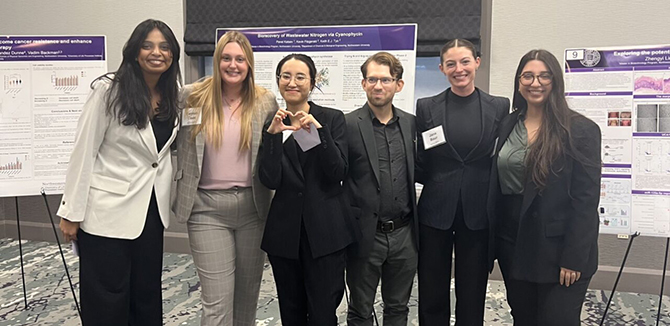Top Symposium Presenters Showcase Storytelling Skills
Three MBP students were recognized for explaining complex research in a way that was engaging and relatable.

Presenting overly technical, scientific information to a non-technical audience requires a number of skills.
Hannah Cook (MBP '25) discovered one of those skills is something that is not often associated with science: Storytelling.
Cook and her classmates in Northwestern Engineering's Master of Biotechnology Program (MBP) recently presented research they conducted throughout their time in the program to a wide-ranging audience at the program's annual Fall Research Symposium. Students delivered oral and poster presentations as part of the event. Cook was named one of three top oral presenters, and she credits that to her storytelling abilities.
"I framed my research within a compelling narrative that highlighted the innovative nature of my project," Cook said. "This storytelling approach helped to convey the urgency and importance of my work, making it resonate more strongly with the audience. I also focused on presenting complex information in a clear and engaging manner, using visuals and analogies to help the audience easily grasp the concepts and helping to make my content more relatable and memorable."
Cook's project was a drug development project for a peptide mimetic compound for the treatment of Alzheimer's Disease and Traumatic Brain Injury (TBI). Her research was conducted with Jeffrey Burgdorf at ENCUE, a startup Burgdorf helped launch out of Northwestern Engineering's Falk Center for Molecular Therapeutics.
Her goal for the oral presentation was to effectively communicate the research’s significance.
"I aimed to present my findings in a way that highlighted the innovative aspects of the methodology and key findings," she said. "I wanted to foster a better understanding of the research’s relevance and inspire constructive discussions that could lead to new insights."
Zhengyi (Janie) Lin (MBP '25) had a similar goal with her research that focused on the molecular mechanisms of a rare genetic disorder called ichthyoses. The main takeaway from her work was identifying how the interaction between one type of RNA and other RNA molecules relate to cell transport functions. The identification highlights a potential role in disease progression and offers new targets for therapeutic exploration.
Lin — whose research was conducted in Amy Paller’s lab at Northwestern's Feinberg School of Medicine — and Pavel Katsev (MBP '25) were named top presenters along with Cook.
"My primary goal was to communicate complex molecular mechanisms in an accessible manner, emphasizing the translational potential of noncoding RNA molecules," Lin said. "I believe the presentation stood out because of its clarity and strong visual elements, including diagrams of pathways and experimental results. I also made sure to engage with the audience using some metaphors to address complex scientific concepts."
Katsev presented a project on biorecovery of nitrogen pollution from wastewater using a cyanophycin-accumulating soil bacterium. During his talk, he explained how managing nitrogen levels in water is essential to prevent problems that lead to algal blooms, harm to aquatic life, emissions of greenhouse gases, and public health risks.
Katsev conducted his research in Professor Keith Tyo's lab within Northwestern Engineering.
"Presenting to peers, faculty, and the MBP Industrial Advisory Board was a fantastic opportunity to share the broader impact of our work," Katsev said. "Preparing for such a broad audience pushed me to revisit and critically evaluate every aspect of our research — from societal motivations down to molecular-scale phenomena."
Once he revisited the research, Katsev did what his fellow top presenters did — figure out a way to transform complex information into relatable content.
"I carefully designed my slides and narration to bridge the audience’s starting perspective with where I hoped they’d be by the end, without any extraneous information that might clutter an already complex subject," he said. "This experience honed my skills in storytelling and scientific communication, both of which are crucial for advancing sustainability projects."

